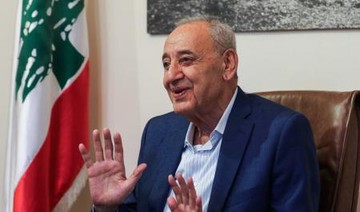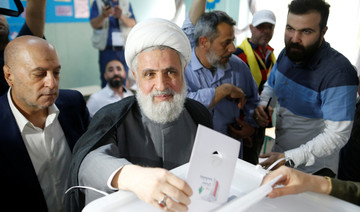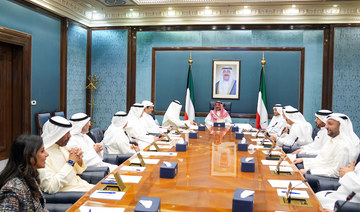BEIRUT: Lebanon’s longtime parliament speaker Nabih Berri often seems like a veteran schoolteacher with a class of unruly students, using threats and jokes and occasional gavel-pounding to keep the assembly in order.
The 80-year-old has held the job for a quarter-century, and is set to be re-elected as speaker for a sixth time on Wednesday, when the new assembly convenes after national elections earlier this month — the first in nine years.
That he faces no challengers, and rarely has over the years, owes much to Lebanon’s sectarian-based and elite-dominated political system, which has mostly kept the peace since the 1975-1990 civil war, but has also spawned political paralysis and endemic corruption.
Berri is seen by some as an embodiment of that system, which shows no signs of changing despite rising discontent. But the parliament speaker, who is one of Lebanon’s most influential and enduring politicians, is also seen as a moderate, unifying figure who lifted his Shiite community’s profile and role in the country’s postwar politics, often acting as mediator among feuding Lebanese factions.
“I don’t believe that there is anyone else who has the characteristics, shrewdness and skills to be parliament speaker more than he does,” said Fouad Saniora, a former prime minister from a rival bloc who had tense relations with Berri during his term.
Lebanon’s political system, built to distribute power among its various sects, mandates a Christian president, a Sunni Muslim prime minister and a Shiite parliament speaker, while the Cabinet and parliament seats are equally divided between Muslims and Christians. As leader of the Shiite Amal movement, which is closely allied with the Shiite militant group Hezbollah, Berri is virtually untouchable. The two parties hold all but one of the 27 seats allotted to Shiites in parliament.
“This is the reality in Lebanon,” said Nabil Bou Monsef, deputy editor-in-chief of the leading daily An-Nahar. “As long as he is the man chosen by his sect to head the parliament, no other sect will veto him as this will lead to sectarian conflict. ... These are the rules of the game.”
Berri’s rise is unusual because he does not come from an established political dynasty. He was born in the African nation of Sierra Leone on Jan. 28, 1938 to a Lebanese trading family with origins in the south Lebanon town of Tibnin. He worked his way up, eventually becoming a lawyer, and says he ended four centuries of feudalism in southern Lebanon.
He was a follower of Imam Moussa al-Sadr, a charismatic Iranian-born cleric who led a Shiite revival in the 1960s that mobilized the long-marginalized community. Berri rose to prominence in 1976, when he became an active member of the politburo of Amal, the military wing of al-Sadr’s movement.
“I was influenced by Imam Moussa al-Sadr in every aspect,” Berri told The Associated Press in a recent interview in his office, which is decorated with an icon of the Virgin Mary and a picture of Berri meeting the late Pope John Paul II.
Berri was elected leader of the Amal movement in 1980 after al-Sadr disappeared while visiting Libya two years earlier. He forged close ties with Syrian President Hafez Assad and remains closely allied to Assad’s son and successor, Bashar.
Amal fighters battled Israeli troops when they invaded Lebanon in 1982, but failed to prevent them from reaching the capital, Beirut. The Shiite fighters later resorted to insurgent attacks, and along with Hezbollah took credit for the Israeli withdrawal in 2000. To this day, Berri says his greatest political achievement was setting up the “resistance.”
Amal struggled during Lebanon’s civil war, however, especially after Iran set up Hezbollah in the early 1980s, drawing Amal defectors into its ranks. The two Shiite groups fought each other on several occasions during the war, but eventually mended ties, and today form the backbone of a Lebanese coalition allied with Syria and Iran.
“When it comes to resistance (against Israel) and goals and everything, we are one body,” Berri said about his ties with Hezbollah. “It is not a Shiite thing. This is a national coalition.”
Berri became known in the West in June 1985, when he helped mediate the release of 39 American hostages after 17 days in captivity. They were held by Shiite extremists who had hijacked a TWA Boeing 727, killed a passenger — US Navy diver Robert Stethem — and demanded the release of 700 Arabs held by Israel.
In the years after the civil war, Berri emerged as a canny mediator who maintained friendly ties with the country’s various factions and worked to prevent them from relapsing into civil war. Known to his supporters as the “Istez,” a title reserved for lawyers, Berri plays an outsized role in naming presidents, forming governments and passing legislation, and his Beirut residence is invariably on the itinerary of visiting foreign dignitaries.
But he is also seen as part of a narrow political elite that has been unable to provide basic services. Nearly 30 years after the civil war ended, Beirut still experiences routine power outages, and a dispute over trash collection in recent years sparked mass protests, organized with the hashtag #YouStink drive, directed against the political class.
Critics accuse Berri of holding up the legislative process when it suits his needs, and his supporters have taken to the streets in violent protests when other factions have challenged him. Earlier this year they blocked Beirut streets with burning tires and trash bins after a leaked video showed the foreign minister calling Berri a “thug” in a closed meeting.
Berri, who has nine children and 26 grandchildren, insists he won’t follow the local tradition of keeping his job in the family, but the octogenarian also has no plans to step down.
“There is no retirement in politics,” he said. “As long as you serve your people and you can work, you will work.”
Speaker’s long tenure embodies Lebanon’s political stasis
Speaker’s long tenure embodies Lebanon’s political stasis
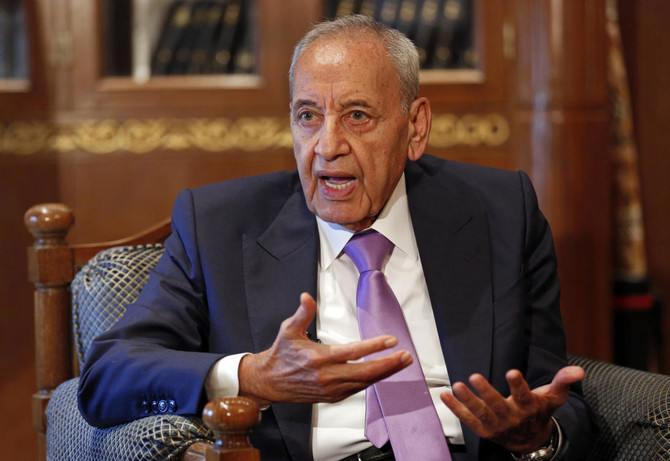
Kuwait economic fund signs coordination MoU with ILO
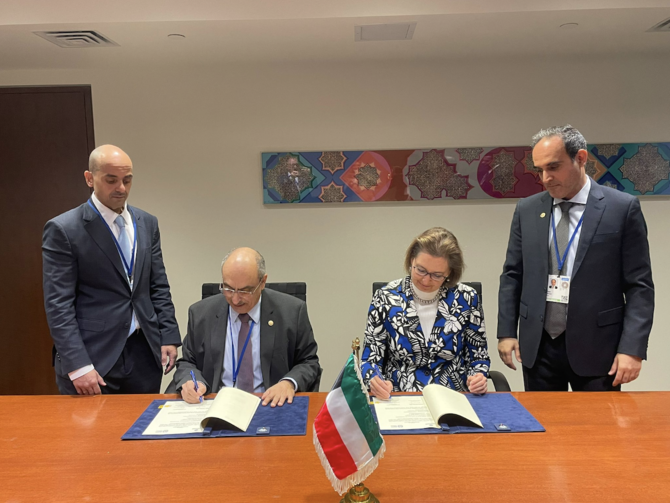
- MoU aims to coordinate joint actions in economic and social development in developing countries
WASHINGTON: The Kuwait Fund for Arab Economic Development has agreed a memorandum of understanding with the International Labor Organization to enhance development cooperation, Kuwait News Agency reported.
The MoU was signed by KFAED Acting Director General Waleed AI-Bahar and ILO Assistant Director General for External and Corporate Relations Laura Thompson on the sidelines of the 2024 spring meetings of the International Monetary Fund and World Bank in Washington DC.
The MoU establishes a framework for technical cooperation and aims to coordinate joint actions in economic and social development in developing countries. This includes exchanging expertise and information in economic, financial and commercial sectors.
The five-year renewable agreement focuses on collaborative activities aligned with the goals of both organizations in the countries in which they operate. The partnership will also involve sharing resources in areas of mutual interest such as statistics, policy enhancement, youth economic empowerment, gender equality at work, crisis response and South-South cooperation.
Regular consultations are planned to ensure effective coordination of operations in the targeted nations.
International reactions after Israel’s reported attack on Iran
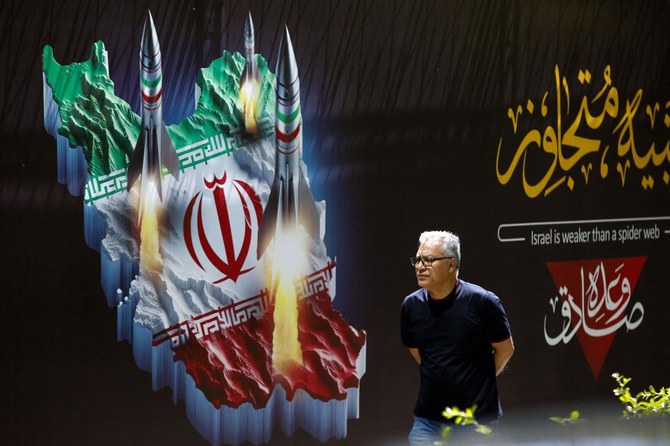
- Widespread calls for utmost restraint between Iran and Israel to avoid serious repercussions
PARIS: Here are some international reactions Friday after Israel’s reported attack on the Iranian province of Isfahan, where it has military bases and nuclear facilities:
UN SECRETARY-GENERAL ANTONIO GUTERRES
UN Secretary-General Antonio Guterres reiterated that it was “high time to stop the dangerous cycle of retaliation in the Middle East,” his spokesperson said in a statement.
“The Secretary-General condemns any act of retaliation and appeals to the international community to work together to prevent any further development that could lead to devastating consequences for the entire region and beyond,” Stephane Dujarric said.
RUSSIA
Russia has made clear to Israel that Iran “does not want escalation,” Moscow’s foreign minister Sergei Lavrov said Friday, after reports Israel had carried out retaliatory strikes against its arch-rival.
“There have been telephone contacts between the leadership of Russia and Iran, our representatives and the Israelis. We made it very clear in these conversations, we told the Israelis that Iran does not want escalation,” Lavrov said in an interview with Russian radio stations.
UAE
The United Arab Emirates’ foreign ministry on Friday expressed concern about regional tensions in a statement, calling for ‘utmost restraint’ to avoid serious repercussions.
JORDAN
Jordan’s Foreign Minister Ayman Safadi said on Friday Israeli-Iranian retaliations must end, warning against danger of regional escalation.
GERMANY
German Chancellor Olaf Scholz called for de-escalation following a strike on the Iranian city of Isfahan and said Berlin would work with its partners in this direction.
“De-escalation remains the order of the day in the near future. And we will also talk about this with all our friends and allies, and work together with them in this direction,” Scholz told reporters on Friday.
G7
G7 foreign ministers Friday urged “all parties” to “work to prevent further escalation” in the Middle East, following reports that Israel had carried out revenge strikes on Iran.
“In light of reports of strikes on April 19th, we urge all parties to work to prevent further escalation. The G7 will continue to work to this end,” the Group of Seven industrialized nations said in a statement.
The ministers from Italy, the UK, US, France, Germany, Japan and Canada said they “demand that Iran and its affiliated groups cease their attacks”.
SPAIN
Spanish Prime Minister Pedro Sanchez called Friday for all sides to avoid “an escalation of the conflict in the Middle East” after reports that Israel carried out retaliatory strikes on Iran.
“We must avoid any action that would lead to an escalation of the conflict in the Middle East. The seriousness of the moment demands responsibility and restraint from all parties,” he wrote on X.
JAPAN’S CHIEF CABINET SECRETARY YOSHIMASA HAYASHI
“Japan is deeply concerned about the situation in the Middle East and strongly condemn any actions that lead to the escalation of the situation.
“Japan will continue to make all necessary diplomatic efforts to prevent the situation from worsening further.”
CHINA
“China opposes any actions that further escalate tensions and will continue to play a constructive role to de-escalate the situation,” said foreign ministry spokesman Lin Jian.
IAEA
“IAEA can confirm that there is no damage to Iran’s nuclear sites. Director General Rafael Grossi continues to call for extreme restraint from everybody and reiterates that nuclear facilities should never be a target in military conflicts. IAEA is monitoring the situation very closely,” the International Atomic Energy Agency said on X.
OMAN
“The Sultanate of Oman is following the continuing tension in the region and condemns the Israeli attack this morning on Isfahan,” the foreign ministry said, adding that it also “condemns and denounces Israel’s repeated military attacks in the region.
“Oman once again appeals to the international community to address the causes and roots of tension and conflict through dialogue, diplomacy and political solutions, and to focus on ceasefire efforts in Gaza and resort to international law and United Nations resolutions to reach a just and lasting solution to the Palestinian issue.”
EC PRESIDENT URSULA VON DER LEYEN
“We have to do everything possible (so) that all sides restrain from the escalation in that region ... It is absolutely necessary that the region stays stable and that all sides refrain from further action,” European Commission president Ursula von der Leyen.
UK
“We have condemned Iran’s reckless and dangerous barrage of missiles against Israel on Saturday and Israel absolutely has a right to self-defense. But as I said to Prime Minister Netanyahu when I spoke to him (this week) and more generally, significant escalation is not in anyone’s interest, what we want to see is calm heads prevail across the region,” Prime Minister Rishi Sunak said.
ITALY
“We invite everyone to be cautious to avoid an escalation,” Foreign Minister Antonio Tajani told RAI news on Capri where Italy is hosting a meeting of foreign ministers from the Group of Seven nations.
“This is something we from the government’s side take very seriously and are following very closely,” Foreign Minister Tobias Billstrom said.
“There has to be an end to the exchange of blows and escalation.”
Gazans cool down in seawater despite nearby Israeli vessels

- Soaring temperatures in the embattled Palestinian enclave have prompted Gazan children to resort to the sea
RAFAH: Soaring temperatures in Gaza during the past week have driven thousands in the enclave’s southern city of Rafah to seek respite on beaches.
The proximity to Israeli military vessels did not stop hundreds of war-weary Gazans from bringing their children to enjoy a day of paddling and swimming, according to Arab News’ reporter in the embattled Palestinian enclave.
Many of the 1.4 million displaced Palestinians in Rafah live in makeshift shelters, including tents, on the beach, near the Egyptian border.
Since the Israeli onslaught on the Gaza Strip broke out on Oct. 7 last year, Gazans have been forced to resort to salty seawater for washing, bathing and even drinking due to the collapse of the water system.
Dubai carrier Emirates suspends check-in for onward connections, flydubai cancels Iran flights

- Dubai International Airport temporarily limiting the number of arriving flights for 48 hours from 12 p.m. on Friday
DUBAI: Dubai’s flagship airline Emirates is suspending check-in for all customers with onward connections through the city until 2359 GMT on Friday, three days after a record storm swept the United Arab Emirates.
Emirates, one of the world’s biggest international airlines, said customers traveling to Dubai as their final destination may check-in and travel as usual.
The suspension shows the airline and its hub, Dubai International Airport, are still struggling to clear a backlog of flights after the UAE saw its heaviest rains in the 75 years records have been kept, bringing much of the country to a standstill for two days and causing significant damage.
Dubai International airport, one of the world’s busiest, later said it was temporarily limiting the number of arriving flights for 48 hours from 12 p.m. on Friday to speed up recovery operations from rain and flooding.
Thousands of passengers have been affected by flight cancelations this week, Dubai Airports Chief Executive Paul Griffiths told local radio station Dubai Eye on Friday, after the storm flooded taxiways.
The storm, which hit neighboring Oman on Sunday, pounded the UAE on Tuesday, with 20 reported dead in Oman and one in the UAE.
Dubai’s budget carrier flydubai meanwhile canceled flights to Iran on Friday after receiving an official alert, a statement said.
“In line with the issued NOTAM (notice to air missions), our flights to Iran today have been canceled,” said the statement.
One flight which had already departed for Tehran returned to Dubai after the Iranian capital’s airport was closed, it added.
Flights were suspended across swathes of Iran as Iranian state media reported explosions in the central province of Isfahan.
Flight-tracking software showed commercial flights avoiding western Iran, including Isfahan, and skirting Tehran to the north and east.
The main road that connects the UAE’s most populous emirate Dubai with Abu Dhabi remains partially closed, while an alternative route into Dubai requires vehicles to use a road that is entirely covered in floodwater where cars and buses have been abandoned.
In the UAE’s north, including in the emirate of Sharjah, people were reportedly still trapped in their homes, while others there said there had been extensive damage to businesses.
Rains are rare in the UAE and elsewhere on the Arabian Peninsula, which is typically known for its dry desert climate where summer air temperatures can soar above 50 degrees Celsius.
The UAE’s National Center of Meteorology said on social platform X that Monday may see light rainfall by late night and forecast “a chance of light to moderate rainfall, might be heavy at times over some areas” for Tuesday, with a fall in temperatures over some coastal areas.
Iran closes air space, commercial flights diverted after apparent Israeli retaliatory strikes

- Drones shot down over Isfahan, says Iranian state media
- Israel military refuses to comment on incident
DUBAI/WASHINGTON: Israeli missiles have hit a site in Iran, ABC News reported late on Thursday, citing a US official, while Iranian state media reported an explosion in the center of the country, days after Iran launched a retaliatory drone strike on Israel.
Commercial flights began diverting their routes early Friday morning over western Iran without explanation as one semiofficial news agency in the Islamic Republic claimed there had been “explosions” heard over the city of Isfahan.
Some Emirates and Flydubai flights that were flying over Iran early on Friday made sudden sharp turns away from the airspace, according to flight paths shown on tracking website Flightradar24.
“Flights over Isfahan, Shiraz and Tehran cities have been suspended,” state media reported.
Iranian officials said its air defenses did shot down several drones but there had been “no missile attack for now” on the country.
The state-run IRNA news agency reported that Iran fired air defense batteries early Friday morning across several provinces after reports of explosions near the city of Isfahan.
Several drones “have been successfully shot down by the country’s air defense, there are no reports of a missile attack for now,” Iran’s space agency spokesman Hossein Dalirian says on X.
The Fars news agency said “three explosions” were heard near the Shekari army airbase near Isfahan.
Iran’s local media also reported that nuclear facilities in Isfahan were “completely secure” after explosions were heard near the area.
“Nuclear facilities in Isfahan province are completely secure,” Tasnim news agency reports, quoting “reliable sources.”
Israel had said it would retaliate against Iran’s weekend attack, which involved hundreds of drones and missiles in retaliation for a suspected Israeli strike on its embassy compound in Syria. Most of the Iranian drones and missiles were downed before reaching Israeli territory.
Several Iranian nuclear sites are located in Isfahan province, including Natanz, centerpiece of Iran’s uranium enrichment program. Isfahan, Isome 350 kilometers (215 miles) south of Iran’s capital, Tehran, is also home to a major air base for the Iranian military.
Meanwhile in Iraq where a number of Iranian-backed militias are based, residents in Baghdad reported hearing sounds of explosions, but the source of the noise was not immediately clear.
In Syria, a local activist group said strikes hit an army position in the south of the country Friday.
“There were strikes on a Syrian army radar position,” said Rayan Maarouf, who runs the Suwayda24 anti-government website that covers news from Sweida province in the south.
Iranian military positions in Syria had been frequently targetted by Israeli air strikes over the past years. Early this month, an Israeli strike demolished a consular building annex of the Iranian Embassy in Sydia's capital Damascus, killing 13 people, including two generals of Iran's Revolutionary Guards, triggering the Iranian missiles and drones attack on Israel on April 13.
At the United Nations Security Council on Thursday, Iran urged member nations that Israel “must be compelled to stop any further military adventurism against our interests” as the UN secretary-general warned that the Middle East was in a “moment of maximum peril.”
Israel had said it was going to retaliate against Iran’s April 13 missile and drone attack.
Analysts and observers have been raising concerns about the risks of the Israel-Gaza war spreading into the rest of the region.
Oil prices and jumped on the reports of the Israeli strike. Brent crude futures rose 2 percent to $88.86 a barrel, the dollar gained broadly, gold rose 1 percent and S&P 500 futures dropped 1 percent.
Israel’s assault on Gaza began after Palestinian Islamist group Hamas attacked Israel on Oct. 7, killing 1,200, according to Israeli tallies.
Israel’s military offensive has killed over 33,000 Palestinians in Gaza, according to the local health ministry.
Iran-backed groups have declared support for Palestinians, launching attacks from Lebanon, Yemen and Iraq.


